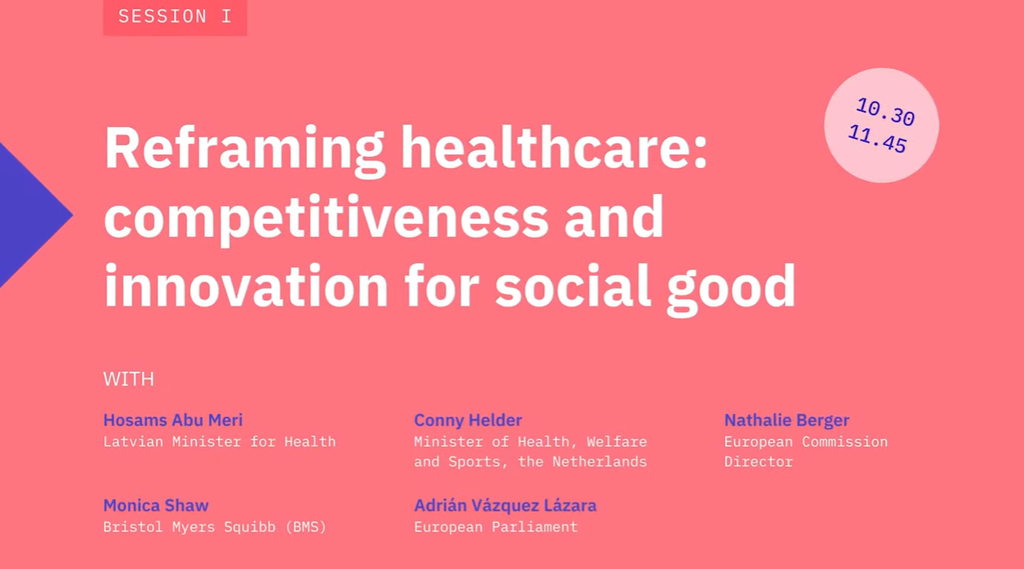Europe's moment: advancing clinical research and health innovation
Next event In person & online

- Area of Expertise
- Sustainable Livelihoods
Sustainable Livelihoods

Prime Minister of Belgium and Trustee of Friends of Europe
The digital revolution is rapidly reshaping the world in which we live. What a few years ago appeared to be mere science fiction is now entering our homes, our streets, our workplaces, our personal lives: refrigerators automatically ordering new stock; thermostats autonomously regulating your heating based on your lifestyle; smart cars finding their own parking spot. These digital innovations make our daily lives easier, but they also bring profound change in other areas.
Businesses and economies are fastening their seatbelts for the deep disruption of the 4thIndustrial Revolution, pushed by three important megatrends with an unseen transformative impact: the internet-of-everything, big data and extreme automation.
Disruptive, technology-driven transformations have always been part of history. We have to avoid falling into the trap of extreme views, whether a naive techno-optimism or an ultra-conservative techno-pessimism. Although we are going through a major societal and economic transformation, it is not the first fundamental disruption humans have faced. As these debates are not new, we should learn from the past.
One of the most important lessons is that technological revolutions allow core questions to surface regarding education, employment and societal organisation. This is because technology is part of our human nature. A human being is a technological being. We have always used tools to supplement our own physical abilities.
One of the most important lessons is that technological revolutions allow core questions to surface regarding education, employment and societal organisation
If Europe wants to take the lead in the 4th Industrial Revolution, it will have to decide on an offensive strategy to deal with these new digital megatrends. The European mindset has too often been one of suspicion and mistrust. Europe has been playing defence: partly because it was confronted with global technology leaders from outside Europe, but also because new technologies provoke negative emotions among parts of the general public.
This is not new. Technological revolutions have always generated anger and fear because disruption means that some people feel they are losing or risk losing. But behavioural economics has shown that acting on negative emotions such as anger and fear leads to bad decisions, both individual and collective.
Legislators faced with disruptive evolutions have the very delicate task of seizing these new opportunities while mitigating the risks. Let me focus on two fields that are ready for a bold, European offensive strategy.
The first is (big) data. The digital revolution is a data revolution. Between 2000 and 2012 the global production of data grew 2,000-fold and the amount of all available data is expected to double every two years. In the years to come, this data will increasingly drive our economy. The OECD identified big data as one of the most important sources of growth and innovation. In Germany, studies have shown that the use of big data can enable companies to boost their productivity by up to 30%.
A data-driven economy is a stronger economy; therefore the European Union has to bolster data-driven innovation and growth. The strategy on big data, launched in 2014 by the European Commission Vice President for the Digital Agenda, already charted the key steps for the European Union to seize the opportunities of the data revolution and to be able to compete in a global data economy. Three years later, the Commission has outlined the next steps towards a European data economy.
The EU should take a leading role in making sure that all citizens are schooled in digitals skills
For a strong data-driven economy, it is crucial to have a free flow of data between countries. A strong European data-driven economy relies on cross-border transactions including collection, processing and use around the world. Unjustified data localisation requirements are barriers that have an adverse impact on innovation. Uncertainty about the legality of international transfers of personal data has the same negative effect. Strong data protection agreements and rules on international data transfers are therefore the foundations for the free flow of data across borders. If we want the Digital Single Market to prosper, we have to avoid the EU becoming an isolated island that relies only on its own rules of protection and prefers data to be stored on its own territory.
The second field is digital skills, an area where Europe has to step up. The digital revolution will be a net job creator, but the nature of jobs is going to change. By 2020, nine out of ten jobs will require basic digital skills. At the same time, there will be 825,000 unfilled positions for digital jobs. Our start-ups, small companies and large players will need thousands of front-end and back-end developers, data analysts and web marketers. Leadership in the 4th Industrial Revolution will require a massive upgrade of Europe’s current workforce. Every European citizen, regardless of age and background, should be able to take advantage of all the digital opportunities that lie ahead.
The EU should take a leading role in making sure that all citizens are schooled in digitals skills so that the potential of the digital economy and the knowledge society can be fully exploited. It is time to take action. We need massive investment in digital skills and education, while at the same time strengthening those other qualities – creativity, critical thinking and emotional intelligence – that make us humans different from machines.
This article is part of Friends of Europe’s upcoming discussion paper ‘Disruptive models of healthcare for Europe’, which brings together the views of Friends of Europe’s large network of health professionals, policymakers, scholars and business representatives on disruptive innovation for health. This discussion paper closes a series of three high-level roundtables that Friends of Europe organised last year to examine the steps needed to create “disruptive models” for overhauling and improving healthcare systems across the EU.
Next event In person & online

Past event In person & livestreamed

Past event In person

Past event In person & livestreamed





Stay informed
We use cookies and similar technologies to adjust your preferences, analyze traffic and measure the effectiveness of our campaigns. Learn more about our privacy policy.